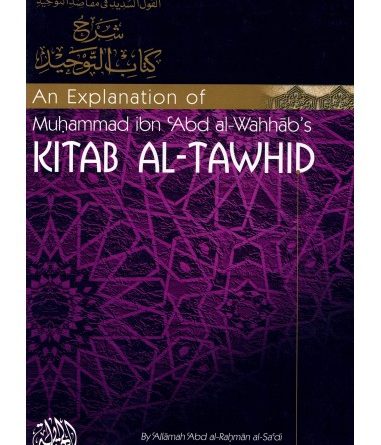Kitaab At Tawheed – Part 3 (Transcribed Class)
Kitaab At Tawheed – Part 3
بسم الله الرحمن الرحيم
To continue with chapter one
The author started the explanation of Kitab At-Tawheed with the verse which states that Tawheed is the aim of our creation. You will notice that the author starts every chapter with either a verse of Quran or a hadith.
This chapter begins with the verse:
وَمَا خَلَقۡتُ ٱلۡجِنَّ وَٱلۡإِنسَ إِلَّا لِيَعۡبُدُونِ (٥٦)
And I did not create the Jinn and mankind except to worship Me.
[Surah Adh-Dhariyat 51:56]
Allah is stating the reason for our creation; to worship Him alone. This is the only reason for creating all of the creation. Accordingly, He gave us the intellect to understand His sent messages, revealed books and the wisdom behind His creation. We were not created to just live and die like cattle, since there wouldn’t be any wisdom in sending His messengers and revealing His books to us otherwise.
That’s why Allah says :
إِنَّ ٱلَّذِى فَرَضَ عَلَيۡكَ ٱلۡقُرۡءَانَ لَرَآدُّكَ إِلَىٰ مَعَادٍ۬ۚ
Verily, He Who has given you (O Muhammad SAW) the Qur’an (i.e. ordered you to act on its laws and to preach it to others) will surely bring you back to the Ma’âd (place of return, either to Makkah or to Paradise after your death, etc.). [Surah Al Qasas 28:85]
So we are going to be asked about this Quran which was revealed to us when we return back to Allah and He will ask us what we did in response to His Revelation and how we responded to His commands.
Therefore, you will certainly be brought back to your place of return where you shall be recompensed for your deeds. You will either be rewarded with good if your deeds were righteous or you will be punished if your deeds were evil.
The wisdom behind creation was never to bring any benefit to Allah, He is in no need of any of His creation; Allah is the Sustainer and the Provider for the entire creation. Nowadays, people say the most important aim is to build the earth, making technological advances to improve our lifestyle and to live and let live. However, this is not the wisdom behind the creation at all. You are not here to develop a place which will be ruined and destroyed.
We are here to worship Allah and be tested. The wisdom behind the creation was never to bring any benefit to Allah.
That’s why Allah says:
مَآ أُرِيدُ مِنۡہُم مِّن رِّزۡقٍ۬ وَمَآ أُرِيدُ أَن يُطۡعِمُونِ (٥٧)
I seek not any provision from them (i.e. provision for themselves or for My creatures) nor do I ask that they should feed Me (i.e. feed themselves or My creatures). [ Surah Adh- Dhariyat 51: 57]
So, does this mean that everyone will worship Allah alone? When Allah says :
“إِلَّا لِيَعۡبُدُونِ” (‘except to worship Me’) it refers to the intention and wisdom behind the creation. Allah told us the aim of our creation. However, fulfilling this aim is not obligatory. Allah let us choose whether to obey Him or not. Consequently, some people will live according to the purpose and wisdom they were created for while others will refuse. Shaykh Uthaymeen said this is the purpose of our creation and it is not imposed upon us.
Then, the Shaykh continues to explain the meaning of ‘al Jinn’ and ‘al Ins’. The word ‘al Jinn’ comes from the ‘unseen’, something which is concealed from us. This is the meaning of ‘al Jinn’ language wise. ‘Al Jinn’ are a creation which are hidden from us. Even the word ‘Jannah’ shares the same meaning language wise. The texts mention that ‘al Jannah’ (paradise) is filled by abundant vegetation which makes it appear hidden. Imagine you find a palace which is surrounded by trees, plants and flowers, this would make the palace unseen.
‘Al Ins’ can be translated as ‘humankind’. This word comes from “al-Uns”’ ‘ which is due to the fact that humans need to interact and socialise with each other and cannot live in isolation, It also originates from the meaning of forgetfulness“النسيان”
Allah says He did not create the’ Jinn’ and ‘Ins’(humankind) except to worship Him alone. Scholars have said that “إِلَّا لِيَعۡبُدُون” (except to worship Me alone) has several meanings in Tafseer. They are all correct and there is no contradiction between them. For instance, one of the meanings of “إِلَّا لِيَعۡبُدُون” (except to worship Me) is to single out Allah in worship “إِلَّا لِيُوَحِّدُون” . Another meaning is interpreted as ‘they should submit themselves to Me’ i.e. to the orders of Allah “إِلَّا لِيُطِعُون” obeying Allah, submitting to Him. Hence, all the interpretations refer to the wisdom behind the creation of Jinn and Mankind (to worship, submit and obey Allah alone).
The Shaikh continues to say that since there is an aim behind the creation, Allah distinguishes between humankind and animals according to this aim. Beasts don’t possess intellect. However, Allah gave humans intellect to be able to realise, think, understand, to look at the universe and to ponder by themselves. What is more, Allah gave us the ability to be able to see His signs and ayat in His Creation. Accordingly, in order to fulfil this aim, Allah sent messengers and revealed books such as the Bible, Torah, Zabur and the Quran by which we could understand how to live according to the purpose of our creation.
Thus, Allah sent these messengers and books for us to be able to fulfil the reason we were created for. Accordingly, I have to use my intellect to understand the revelation and comprehend the Quran and the way of the messenger صلى الله عليه وسلم (his sunnah).This is the only way to be able to fulfil and live upon the purpose of our creation; to worship Allah.
The Shaikh says if humankind were supposed to live like animals and beasts, to be born and produce offspring, eat, drink and die. Then where is the reason for sending the messengers and revelation? Humans are indeed distinguished from animals. We are in this world to fulfil the purpose of our creation and if we do so, Allah promised to reward us with an eternal bliss in paradise.
The true living is when we pass the exam, after fulfilling the purpose of our creation and pleasing our Lord. If we are successful we will have a blissful life free from any obligations in Jannah, by Allah’s mercy.
Then Allah سُبْحَانَهُ وَتَعَالَى says..
وَلَقَدۡ بَعَثۡنَا فِى ڪُلِّ أُمَّةٍ۬ رَّسُولاً أَنِ ٱعۡبُدُواْ ٱللَّهَ وَٱجۡتَنِبُواْ ٱلطَّـٰغُوتَۖ
And verily, We have sent among every Ummah (community, nation) a Messenger (proclaiming): “Worship Allâh (Alone), and avoid (or keep away from) Tâghût[] (all false deities, etc. i.e. do not worship Tâghût besides Allâh).” [ Surah An-Nahl 16: 36]
The word ‘Ummah’ has several meanings according to the context in which it appears. It can mean the people of a particular time or every group of people in a place or a country. People began to commit Shirk (Idolatry) at the time of the people of Nuh عليه السلام and this carried on until the time of Prophet Muhammad صلى الله عليه وسلم . Because of that, Allah sent to every single group of people (every Ummah) on earth a messenger. There are messengers and prophets Allah informed us about and many messengers and prophets which we are not informed about. We don’t know the people to whom they were sent but we believe they existed.
Hence, all of Allah’s messengers came with one very same message without exception: to worship Allah alone and to keep away from the at-Taghut.
What is at Taghut? The word Taghut comes from ‘Tughiyan’ which means something that exceeds the limits. For example, when there is a flood such as the tsunami the water goes beyond the limits. This is the linguistic meaning. Likewise, when a slave exceeds, transgresses and goes beyond his limits with regards to the rights of Allah then he is a Taghut. Only Allah has the right to be worshipped and obeyed. A Taghut is a slave and he has no right whatsoever to be worshipped or obeyed in something against Allah’s commands. Iblees is the head of Tawagheet (plural form of ‘At Taghut’), he is the chief of them, because he has been worshipped (in the sense of people obeying him instead of obeying Allah) and followed for centuries.
Thus At Taghut can be a person, an idol or a sorcerer. They are those people who ask their followers to obey them, to worship and to supplicate to them, they are “Tawagheet”. That is why Imam Ibn Qayyim said At Taghut is anything or anyone who went beyond his limits within these three categories, namely: “Ma’bud” (worshipped), “Matboo” (followed) and “Mutah” (obeyed).
An example of the category of “Ma’bud” (worshipped) would be the mashaikhs (leaders) of the Sufiyyah sect who are worshipped besides Allah by their followers. Since these Sufi leaders approve and are pleased with it, they are from At Tawagheet. However, if someone is worshipped against his will and he hates it such as the prophet Isa Ibn Maryam عليه السلام (Jesus) then definitely he is far from being included among the Tawagheet.
With regards to the category of ‘Matboo’; those who are followed. These are usually magicians who follow the way of Shaytan, so anyone who is followed in something which displeases Allah and he is pleased with it then he is a Taghut. Also, this ‘Matboo’ category includes deviated mashaikh who are followed in their misguided rulings. For example, when a deviated shaykh says that Hijab (covering) is not obligatory for women and people follow him on this thus he becomes a Taghut.
With respect to the Mut’ah; the one who is obeyed. Rulers are the ones who usually fall into this category. This occurs when people put aside Allah’s commands and follow man made rulings and laws instead, knowing that they are doing something different from what Allah commanded. If someone obeys them in this then this ruler is a Taghut. However, this ruling is subjected to certain conditions. When a ruler of any Islamic country issues a law which differs from the Shari’ah. Firstly, scholars have to analyse whether this act is kufr (disbelief) or not. It will be Kufr if the ruler who issued this ruling believes with his heart that he has the right to do so or what he ruled is better than Allah’s rulings.
However, if this same ruler knew that he should follow Allah’s rulings and believes that what Allah legislates is the best ruling which has the best wisdom. Yet, he legislated or he judged with something other than that due to; his desires or fear from what other democratic super power countries may ban him, or he might be ignorant, or he might have scholars and people around him who are deviated and telling him this is allowed. Then in this case, this is not kufr akbar (major disbelief) this is lesser shirk and lesser kufr and from the major sins.
This issue is extremely important because the Khawarij sect makesá Takfeer (declaring someone unbeliever) to the rulers without understanding these conditions. Ibn Abbas رضي الله عنه, said that judging with other than the rulings of Allah ‘it is not the greater kufr rather it is the lesser kufr’. Scholars clarified further when judging against the Shari’ah will be greater Kufr (major disbelief). This ruling is subjected to what the person believes in his heart, if he thinks that the rulings of Allah are no longer valid or are barbarian this could be Kufr so we need to take care.
This is a edited transcribed class given by Zayneb al Kateb to her students. To join please visit (ONLY SISTERS)



